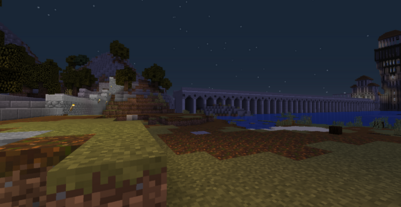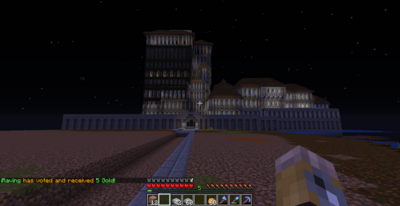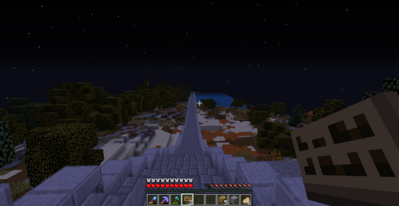Hydruntum: Difference between revisions
>Brentbourguignon (major changes, updating the entire history and making everything current) |
>Brentbourguignon (major changes, updating the entire history and making everything current) |
(No difference)
| |
Revision as of 16:32, 29 April 2019
| ||||||||||||
Hydruntum is a town and Byzantine foothold in the south-east of the Italian Peninsula. It is an important gateway between Western Europe and the Byzantine empire. It's architecture is an eclectic mix of Arabian, Greek and European influences.
History
The town was found on the 8th of December 2018 by Brentbourguignon as "Ur". Soon after being found, the town was invited to join the Italia nation, which it subsequently did. Residents of Amalfi (another Italian town) however performed frequent raids on the city and this made Ur soon leave Italia again. A few days later, on the 12th of December, Ur found an ally in Byzantium and thus joined their nation. In honour of joining Byzantium, the town was renamed Brentopolis to fit the greek theme and later again renamed to Hydruntum. After it's turbulent beginnings Hydruntum grew steadily, both in number of chunks owned and in residents. Numerous towns and nations have formed and fallen in the vicinity but Hydruntum remains a bastion of stability in a turbulent region.
Geography and politics
Hydruntum has been a center of Byzantine activity in the region. It was historically surrounded by the Italia nation which later became inactive and eventually became the nation of Rome. In january, a new nation called Italy was formed (this time under the leadership of Erwinning). This new nation proved quite active but divided the political landscape of the region even further.
To the east, across the adriatic; Albania was found with it's capital of Tirana having a direct connection with Hydruntum through the Justinian bridge. After both the nation of Albania aswell as the town of Tirana fell, the land was annexed into Hydruntum; forming the eastern district.
All the while, Hydruntum has remained loyally byzantine and it's mayor is currently in his second term as a praetor of the greater roman empire.
Architecture and infrastructure
One of the largest buildings, both in height and floorspace is the palace, the home of Hydruntum's mayor and completely fortified castle. Both the town hall, cathedral and mausoleum dominate the rest of the Hydruntian skyline.
The cathedral is 8 chunks large with an interior height of 35 meters. The spire (which was added on later) reaches a height of 95 blocks above street level.
The town hall is a neo-renaissance building completely build in marble and stone. It features the town spawnpoint, the throne room and a viewing area which provides an overview of the entire town in the spire.
Hydruntum is famed for its unbreachable walls, which completely seal of the city from the outside. The walls have a total length of over 1 kilometer and are 35 meters tall and three blocks thick. The city can only be entered from the outside through 2 gates; The aptly named Western gate in the West and the Justinian gate in the East. Besides these outer gates, each quarter of the city can also be seperately locked. In the unlikely case of a siege, there is also a whole array of traps spread throughout the city. All gates of Hydruntum aswell as the traps can be activated remotely from a central control room.
Byzantium Square is the main square of Hydruntum and is located in the heart of the central district, right outside of the town hall.
Hydruntum is connected to the former Albanian capital of Tirana (now the eastern district), aswell as the Balkans and Eastern Europe by the Justinian Bridge. (A massive 200 block long, 16 block wide, and 20 block tall bridge made out of cobblestone, smoothstone, stone bricks and smoothstone slabs. It once featured a direct railway connection between Hydruntum and Tirana.


